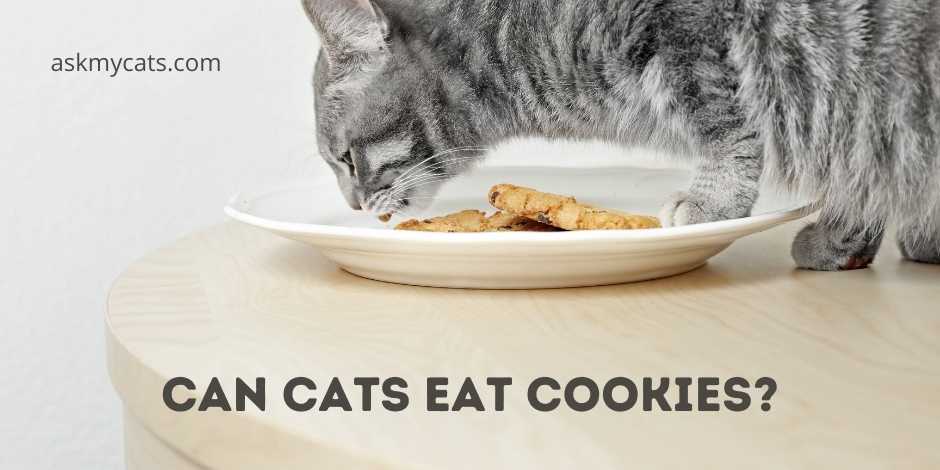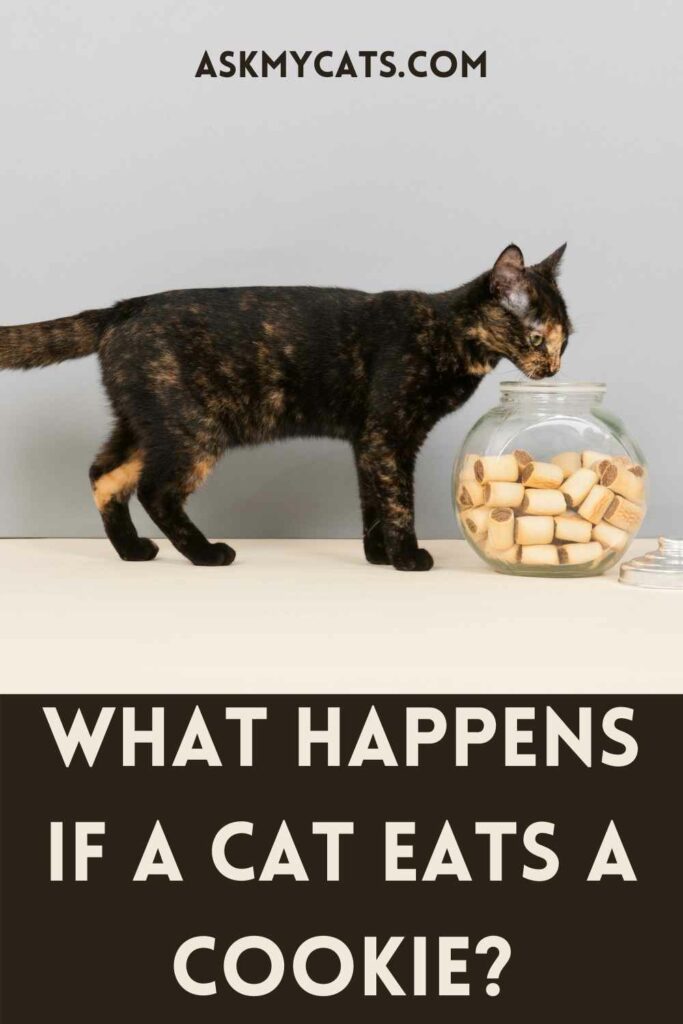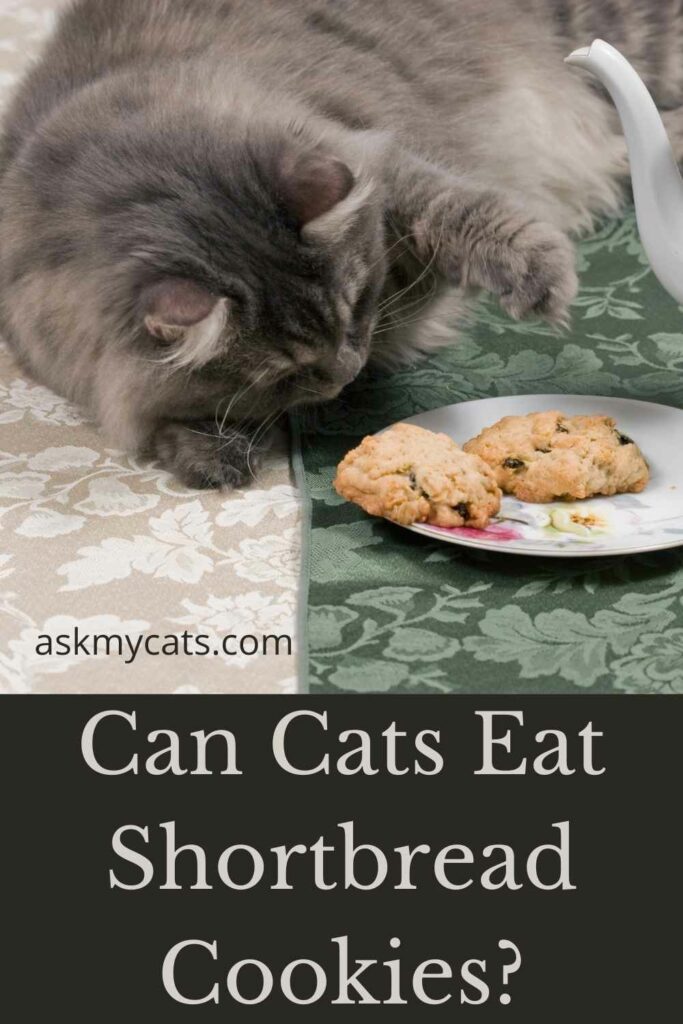Cookies have become popular in nearly every home (including mine). As a result, it’s not surprising that people inquire if they may give their cat some.
Cookies are safe for cats to consume, but they may have a detrimental impact on their digestive system. Chocolates, white and brown sugars, artificial sweeteners, vanilla extract, butter, and other ingredients are common in cookies. All of these ingredients are poisonous to cats.
This article will provide you with an outline of how cookies affect your cat.


Give Your Cat the Perfect Day
Get the Free Ebook!
Are Cats Allowed To Eat Cookies?
Yes, cats can eat some varieties of cookies. However, do so in moderation. To be honest, it’s best if you don’t give your cat a taste of your cookie. The reason for this is that some components, like raisins and chocolate, are poisonous to cats.
Cookies come in a wide range of flavors, with chocolate chip cookies being one of the most popular.
Chocolate chip cookies may be a tasty treat for humans, but they are not for our feline companions. Let’s look at what’s in chocolate chip cookies to have a better understanding.
The following ingredients are included in a handmade chocolate chip cookie recipe:
- Butter (not safe)
- White Sugar & Packed Brown Sugar (A big No)
- Eggs
- Vanilla Extract (toxic)
- Baking Soda
- Salt (Also toxic)
- All-purpose flour
- Chocolate Chips (Huge Red Flag)
- Walnuts (Avoid any nuts)
A slice of cookie might, in fact, be safe for cats. The chocolate chip cookies, on the other hand, contain microscopic chocolate pieces that can be fatal.
Theobromine is a poisonous chemical found in chocolate, including small amounts of it in cookies.
Chocolate, even in tiny amounts, may cause strong reactions. Abnormal cardiac rhythm, tremors, convulsions, and even death are among the symptoms.
If you’re feeding cookies, be sure they don’t include any chocolate. In addition, never offer more than one mouthful.
Are Cookies Bad To Cats?
Cookies are generally safe for your cat to eat if given in small quantities.
However, they occasionally include unusual substances that improve the flavor and taste of cookies in humans but are harmful to cats. For example, raisins, chocolate, grapes, caffeine, xylitol, and other substances are harmful to cats.
In cats, xylitol and other artificial sweeteners cause intestinal problems, seizures, blood sugar drops, and even death. Furthermore, chocolates are extremely poisonous to cats.
In cats, chocolate consumption causes tremors, anxious symptoms, seizures, an irregular heartbeat (arrhythmia), vomiting, stomach discomfort, pale mucous membranes, and death.
Raisins and grapes induce renal issues in cats, while caffeine causes symptoms that are similar to those caused by chocolate in cats. As a result, you should keep cookies out of your cat’s diet.
You might also like to read about can cats eat oreos
What Happens If A Cat Eats A Cookie?
If you see your cat eating a cookie, it’s unlikely to create any problems, especially if the cookie isn’t chocolate-based.

A couple of bites of cookies won’t hurt. Expect some stomach issues, such as vomiting or diarrhea, if you take too much.
There are no nutritional benefits to feeding your cat sugary foods like cookies. That’s a good place to start.
The issue about cookies is that they are nutritionally useless.
Your pet can exist without carbs, which cookies include because they are obligate carnivores.
Furthermore, consuming too many cookies may result in an excess of sugar in the body.
Worse, feeding your cat chocolate chip cookies or any other chocolate-infused treats might lead to poisoning.
Plain cookies, chocolate cookies, shortbread cookies, oatmeal cookies, peanut butter cookies, and other varieties of cookies are available on the market. You can simply create these cookies at home by looking out for recipes on the internet.
If you don’t want to go into trouble, don’t give these cookies to your adorable kitty companion. Providing cookies to cats can lead to obesity, heart disease, joint difficulties, toxicity, poisoning, renal problems, and other health issues. As a result, you should stay away from these cookies.
Learn the signs and symptoms of some poisoning after feeding cookies to your cat as a conscientious cat owner.
Because cookies have little nutritional benefit for cats, don’t put your cat through the trouble of eating them. The vets say it’s fine to feed plain cookies all at once.
However, check the ingredients to see if they include raisins or chocolates, both of which can be poisonous. Finally, there is no legitimate reason for a cat owner to give their cat cookies.
Cookies, which are high in processed sugars or carbs, are expensive and unsuitable for a cat’s diet and should be avoided.
Even then, just because we enjoy a sweet pleasure provided to us by our cookies doesn’t imply our cats can. Although the flour in cookies is safe, the rest of the ingredients are suspect.
Tell them the facts whenever any of your friends or family question your views about feeding cookies from now on. Always attempt to heed the recommendations of your doctor and pet nutritionist. This will assist you in preventing certain issues in the future.
Also, check out Can Cats Eat Vanilla? Is Vanilla Safe For Cats?
Can Cats Eat Plain Sugar Cookies?
Plain sugar cookies are not suitable for cats. Because cats cannot taste sweet, it makes no difference whether the cookies contain sugar or not. Sugar cookies, like other sugary goodies like candy, aren’t good for cats.
Sugar isn’t poisonous to cats, but it isn’t beneficial for them either. A cat only needs a small quantity of sugar to operate normally, which it can readily obtain from its carnivorous diet.
Sugar cookies, on the other hand, will make them obese and expose them to a variety of health concerns such as heart disease, arthritis, and so on.
Remember that sugar cookies have no nutritional benefit for your cat before offering them to him.
Also, if these cookies are made with chocolate syrup or chips, this may be fatal. Consumption of these biscuits reduces your cat’s lifetime by one or two years.
Almost 60% of domestic cats are overweight right now, so you don’t need to offer extra calories in their food as a conscientious pet owner.
Also, check out can cats eat candy
Can Cats Eat Cookies Without Chocolate?
Plain cookies may not contain chocolate, raisins, grapes, fruits, xylitol, or other additives, but they will have dairy products such as butter and sugar. These two elements have a detrimental influence on your cat’s health.
Your cat should not be given any cookies, according to veterinarians. Your cat will not be harmed if you feed him plain cookies all at once. However, if you and your cat rely entirely on these cookies for an extended period of time, a problem will develop.
Aside from having little nutritional value, these cookies will add extra calories to your cat’s diet, causing them to gain weight.
Cats thrive on a high-protein diet, but when we feed them high-carbohydrate foods, their stomachs fail and they begin to display symptoms.
Cats that eat too much sugar are more prone to gain weight and acquire illnesses such as heart disease, diabetes, and joint problems.
Can Cats Eat Oatmeal Cookies?
Oatmeal is one of the healthiest meals for humans, but cats will have issues with it. These cookies are packed with nutrients and have a sweet, crunchy texture that is not suitable for cats.
Unfortunately, because these cookies frequently include raisins and chocolate, which are very poisonous to cats, this is fatal for them.
Even though some cookies are manufactured without these two components, their high sugar and calorie content are harmful to your cat’s health.
Cats typically require around 200-300 calories each day to operate normally. However, a single oatmeal cookie often has over 100 calories. As a result, providing oatmeal cookies to your cat will almost certainly surpass his or her daily calorie intake.
It’s not an issue if it happens all at once. However, your cat will have problems if you feed him oatmeal cookies on a frequent basis. This sweet delicacy will cause you to gain weight and develop a variety of health problems, including diabetes.
Can Cats Eat Chocolate Chip Cookies?
Chocolate poisoning in cats can be caused by eating chocolate chip cookies.

Lethargy, anxiety, sleepiness, tremor, seizure, vomiting, diarrhea, nausea, coma, or even death can occur in cats that have consumed chocolate. Chocolate chip cookies are delicious treats for humans, and we want them every evening.
However, this does not imply that we may feed our cat this food. As previously stated, cats do not vary in any manner from humans in terms of physiological function. Uptake chocolates, especially theobromines, are incompatible with their stomachs.
Theobromine and caffeine, which are toxic to cats, are commonly found in chocolate. Theobromine enters the cat’s circulatory system slowly and causes symptoms within an hour.
The more dark chocolates your cat ate, the more severe the symptoms will be. While chocolates have less theobromine than chocolate powder, which has a significant quantity of theobromine, they are generally safer.
Because chocolate cookies are prepared with chocolate syrup or chips, they have a similar effect as chocolate. Chocolate poisoning in your cat necessitates a veterinarian emergency to rescue it.
Furthermore, chocolate chip cookies include other elements that are detrimental to our beloved cats, such as butter, salt, vanilla essence, walnuts, and so on. As a result, as a cat owner, you must always exercise caution while offering your cat any treats containing chocolates.
The more dark chocolate in the cookies, the more deadly the cookies will become. Theobromine is the active ingredient in chocolate that is exclusively responsible for a cat’s death.
Yes, a chocolate chip cookie has the potential to harm your sweet kitty. Chocolates, as previously said, are fatal to cats. A ten-pound cat may be killed by a tiny amount of chocolate, such as one small piece of baking chocolate.
Can Cats Eat Peanut Butter Cookies?
Peanut butter and cookies are both bad for your cat’s health. Cats are exclusively carnivorous, which means they eat only animal products.
As a result, cookies aren’t the ideal thing to give them, and peanut butter is heavy in fat, salt, and calories, putting your cat’s life in jeopardy over time. Furthermore, rather than possessing trans-fatty acids that are harmful to cats, peanut butter cookies typically have little nutritional benefit for cats.
The majority of peanut butter brands include an excessive amount of sodium salt, which is unhealthy for your pet. This dish also includes a lot of calories due to the high fat and carbohydrate content, which can easily help your cat gain weight.
Indoor cats are less likely to exercise, and after eating these peanut butter cookies, they are more likely to acquire weight, leading to a range of health concerns such as diabetes and heart disease.
Can Cats Eat Shortbread Cookies?
Shortbread cookies often contain unsalted butter, sugar, vanilla extract, flour, salts, and other components. Butter and vanilla are poisonous to cats, and too much sugar and salt can harm their health.

Despite the fact that shortbread cookies contain less sugar than other varieties of cookies, cats are unable to consume them. As previously said, cats are completely omnivorous, which means they eat only animal-based foods.
As a result, giving your cat too much sugar, such as cookies, is not a smart idea. Shortbread cookies with chocolate chips, on the other hand, can be fatal to your cat. Even so, if your shortbread cookies don’t have chocolate chips, they’ll have a lot of margarine or butter in them.
As a result, pet nutritionists advise against giving this cookie to cats. Furthermore, because these cookies include a lot of butter and margarine, they are high in fat and might cause your cat to gain weight.
Sugar content in shortbread cookies may be lower than in other cookies. There’s also a chance it won’t have any chocolate chips in it.
Still, giving some to your feline companion is not a smart idea. What is the reason behind this? They are unable to consume shortbread cookies since they contain a high amount of butter or margarine.
Shortbread cookies may have less sugar than other cookie kinds. Nonetheless, they include more butter or margarine, both of which are rich in fat.
Can Cats Eat Cookie Dough?
No, cats cannot eat cookie dough, especially raw cookie dough because alcohol and carbon dioxide can be produced by yeast in uncooked dough. Both of these things are dangerous.
Don’t attempt to feed your cat when you’re making a cookie in front of them. Cats are naturally inquisitive creatures.
They want to be a part of you and govern over you at all times. They may want to sample a bite of the dough if they witness you making it. You must keep your cat away from raw dough or cookie dough since consumption of this dough might create a variety of issues for your beloved feline.
Additionally, if swallowed, the dough may grow in your pet’s stomach. To be removed from such an occurrence, surgery would be required.
According to scientists, uncooked bread includes yeast that creates both alcohol and carbon dioxide, both of which are toxic to cats. Cats frequently experience diarrhea, vomiting, muscular spasms, stomach discomfort, respiratory problems, and even death.
After ingestion, the uncooked dough swells within your cat’s stomach or obstructs the throat, causing an emergency that requires surgery to remove.
Frequently Asked Questions
Is it OK for cats to eat sweets?
It is not healthy for them. Cats are obligate carnivores, which means they can only consume meat and not plants. Cats, on the other hand, may consume modest quantities of carbs in their diet.
Why does my cat eat cookies?
Sweet-tasting receptors are absent in cats. Despite the fact that cats have over 470 taste receptors, none of them detected the sweetness. They may desire cookies if they see you eating cookies in front of them. Cats, as inquisitive creatures, have always desired a piece of your food.
Can cats have butter cookies?
Cookies have no redeeming features in terms of nutrition—nearly every component in your favorite cookie recipe is something your cat should avoid eating. Most cookies include refined flour, refined sugar, butter, milk, and a variety of spices and mix-ins, all of which can be harmful to your cat’s health.
Final Words
In conclusion, cats and cookies do not mix well. Cookies are a great treat for people, but in the case of cats, they are a bland commodity. Because cats can’t taste sweetness, they don’t need to eat cookies.
Cookies are high in sugar and carbs, which a cat does not require. As a result, while a cookie may seem like a treat to humans, it is never a reward for our cats.
If you want to offer your cat a reward, give them something that is nutritious for them. Drop your questions in the comments section below!
